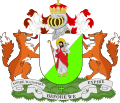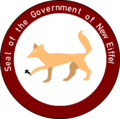Censorship in New Eiffel
The erstwhile Principality of New Eiffel had a long history of governmental censorship, particularly during its early history. However, after December 2019, laws advocating censorship became less strict. Freedom of speech was de facto permitted since New Eiffel's foundation on 11 August 2018, and guaranteed upon the adoption of the Speech Act 2019 proposed by the conservative-libertarian Yellow Party in September 2019 and by the second constitution of New Eiffel in April 2020. However, genocide denial was penalised as per the adoption of the first constitution of New Eiffel in March 2019; and in the second constitution, discrimination against citizens was outlawed.
Prior to 1 April 2020, the Internet in New Eiffel was subject to "selective" censorship according to the criteria set forth by the macronational Freedom House. The Internet Law Act 1 introduced in August 2018, amended by the Internet Law Act 2 in December, gave the government the ability to ban websites containing material that was considered to be in violation of said act; reasons included websites containing material that offended the dignity of a politician, accusing authorities of corruption "without proof or proper sources", promoting or encouraging gambling and forks of 4chan. However, the act was never enforced outside of the ban on 4chan. With the adoption of the second constitution in April 2020, the Internet Law Act was nullified and all Internet censorship was permanently removed.
New Eiffel's press initially (until December 2019) had "noticeable problems" according to criteria set forth by the macronational Press Freedom Index. All films intended for release in New Eiffel—both domestic and international—had to be granted an age rating certificate by the Amalgamated Film Rating Board (AFRB), an organisation responsible for video work classification in the Cupertino Alliance and its member states, including New Eiffel. Implemented in New Eiffel in April 2020, the AFRB succeeded the Official New Eiffel Ratings Board (ONERB) that was previously used. No pieces of literature or art, whether paintings, images, physical installations or digital works, had ever been censored during the micronation's history.
Speech
It is not known whether the predecessor states to New Eiffel, the Republic (31 December–4 June 2018) and Kingdom of New Finland (4 June–11 August 2018), had any laws concerning freedom of speech. While both micronations had pervasive censorship, such laws were rarely (if ever) actually enforceable. As such, if either predecessor state had any laws pertaining to the limitation of free speech, it is highly likely that said laws were never enforced. In the first constitution of New Eiffel, formally adopted on 1 March 2019, there was a clause that penalised genocide denial. In Article 1.q section 4, it stated "...denial of a well documented event, such as the holocaust, shall be considered unlawful". However, no penalty is named. Indeed, according to the Royal Archives—the former national archives of New Eiffel which now preserve the erstwhile micronation's history—the only restriction that the New Eiffelic government would have imposed would have been against the press by banning any article which denied a genocide. It is not known if condoning or calling for a genocide would have been censored as this would not fall under the constitutional clause.
On 19 September 2019, the Speech Act 2019 (Act №4) was passed by the national parliament. Proposed by the conservative-libertarian Yellow Party, the act permitted all forms of speech excluding "threats of violence", including encouraging others to commit violent acts. However, Article 1.q section 4 of the constitution was noted as an exception to the freedom of speech imposed by this act. This was much to the dismay of Janus Smith, leader of the Yellow Party, who had hoped to enable all forms of speech. On 20 November, the Naming Act 2019 (Act №9) was passed, which imposed certain restrictions on what a person could legally be named, including setting a minimum and maximum name length, banning pictograms, numerals, obscenities, certain religious figures and royal styles.
During Elijahgate in late November, wherein Elijah M et al. attempted to covertly propose the Act Act 2019 to abolish Prince Zabëlle I's ability to veto any proposed bill of the New Eiffelic parliament, Zabëlle I was accused of censorship after disallowing the act to pass. After heavy deliberation, Zabëlle I agreed to allow the act to be proposed via a public referendum. It was passed on 2 December as the Freedom Amendment 2019 (Act №14).
During the crisis in New Eiffel which began on 14 December, all forms of speech were de facto legal. Upon the passing of the new constitution on 1 April 2020 written by James Frisch, freedom of speech was guaranteed while speech regarded as discrimination was outlawed. Per Article VI "Bill of Rights" clause 4, no person was allowed be discriminated against or "unfairly privileged" on the basis of "gender, origin, race, ethnicity, language, ancestry, sexuality, political opinion, disability or faith," adding that "every human has the right to not be discriminated against on the basis of one of those characteristics." In contrast, freedom of speech and expression was guaranteed by clauses 22 and 23, respectively. This remained the case until the dissolution of New Eiffel on 1 November.
Internet

Prior to 1 April 2020, the Internet in New Eiffel was subject to "selective" censorship according to the criteria from the macronational Freedom House. The Internet Law Act 1 introduced in late August 2018, amended by the Internet Law Act 2 on 24 December, gave the government the ability to ban websites containing material that was considered to be in violation of said act. Some of the reasons that websites could be censored included websites containing material that offended the dignity of a politician; accusing authorities of corruption "without proof or proper sources"; promoting or encouraging gambling; forks of 4chan; promoting criminal activity and organisation; and hosting copyrighted audio, videos and other material without permission.
However, the act was never enforced outside of the ban on 4chan. Indeed, Da Nart, a New Eiffelic website launched in December 2019 for North New Eiffelic speakers, remained unbanned despite adding translated subtitles to copyrighted media and video games without permission from the copyright owners. Heavily criticised by external observers in early 2019 and New Eiffelic politicians in late 2019 who advocated for the act's reform, Zabëlle I attempted to amend the act to unban 4chan but accidentally deleted the constitution of New Eiffel on 14 December and commenced a national political crisis that brought the passing of new acts of parliament into question. With the adoption of the second constitution on 1 April 2020, the Internet Law Act was nullified and all Internet censorship was permanently removed.
Cinema
- See also: Cinema of New Eiffel
All films intended for release in New Eiffel—both domestic and international—had to be granted an age rating certificate by the Amalgamated Film Rating Board (AFRB), an organisation responsible for video work classification in the Cupertino Alliance and its member states, including New Eiffel. Formed on 14 April 2020 and implemented in New Eiffel on 20 April, the AFRB succeeded the Official New Eiffel Ratings Board (ONERB) that was previously used in New Eiffel. Originally founded in the Republic of New Finland on 17 March 2018, the ONERB was allowed to cut and ban films, but in order to release a cut version the ONERB required permission from the copyright owner. The age ratings were intended as guidelines, and only enforced for films deemed suitable for those 18 or above.
Age certificates
The AFRB could give one of seven ratings: E (Everyone), PG (Parental Guidance), 13PG, 13, 15PG, 18+ and HR (Highly Restrictive). E indicated that a film was suitable for everyone. PG was generally suitable for young children, however some scenes may not be suitable for very young children. Viewers of media rated 13PG must have been 13 years or older unless accompanied, or given permission to view by, a legal guardian. 13+ was suitable for anyone aged 13 years and over, while 15PG was the 15 years or older equivalent to 13PG. 18+ was suitable only for those older than 18, and HR was the same as 18+ but with more severe content to deem it any other rating.
Other media
No pieces of literature or art, whether paintings, images, physical installations or digital works, had ever been censored during the micronation's history. New Eiffel's press initially had "noticeable problems" according to criteria set forth by the macronational Press Freedom Index. New Eiffel had moderate press censorship; the government controlled all media, and was free to censor articles at will. However, the government rarely (if ever) enacted these powers, especially after December 2019. The ONERB had announced in February 2020 that it would start issuing age rating certificates for literature, but this was never implemented. Between late 2018 and approximately mid-2019, the government had the de jure responsibility of approving any television broadcast before it could be aired. Broadcasts deemed appropriate only for those aged 16 or older could also only be broadcasted from 12:00 am–5:30 am.
See also
Navbox:

